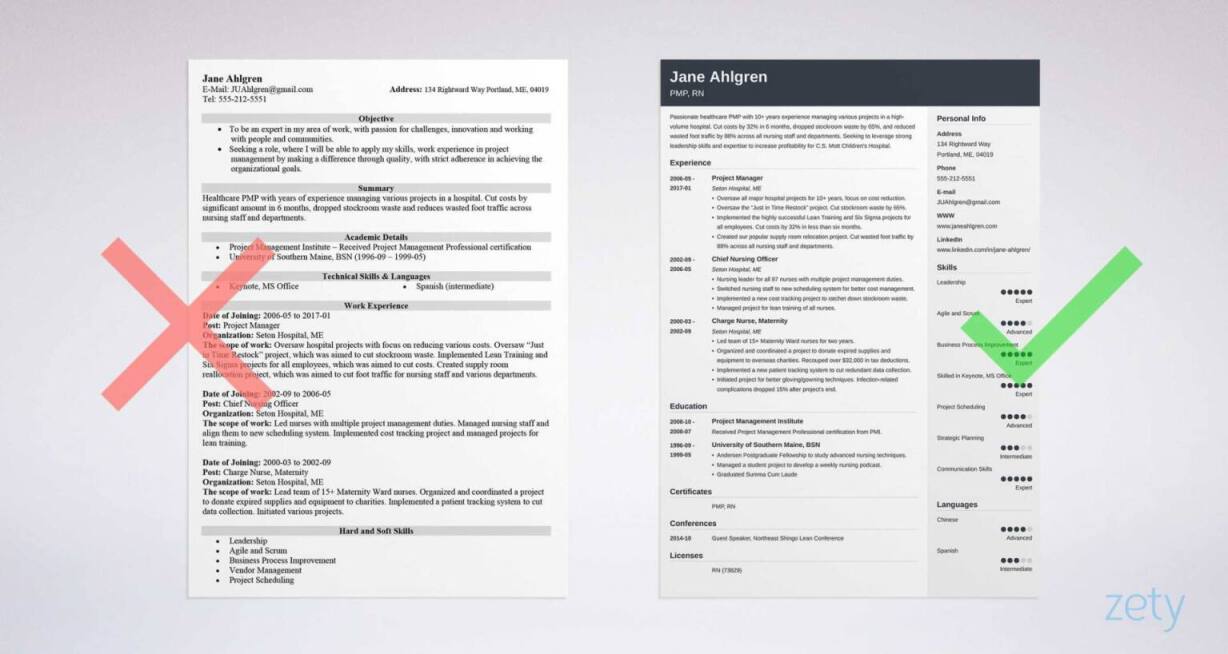How to List Languages on a CV: Proficiency Levels & Tips
Create your CV nowWant to stand out in today’s competitive job market? Showing language skills in your CV can do that. Whether you're fluent or conversational, knowing how to list languages on a CV – and using the correct CV language proficiency levels – can boost your chances.
This guide covers the smartest ways to present your languages on a CV, helping you show recruiters exactly what you bring to the table.
This guide will show you:
- How to put languages on CVs to prove you are more valuable than other candidates.
- How to describe and determine your levels of language proficiency on a CV.
- What to know about language proficiency levels for CVs, language scales, and frameworks.
Want to save time and have your CV ready in 5 minutes? Try our CV builder. It’s fast and easy to use. Plus, you’ll get ready-made content to add with one click. See 20+ CV templates and create your CV here.
Sample CV made with our builder—See more CV examples here.
Need to write about other employability skills on your CV? Check out our guides:
- Essential Customer Service Skills for Your CV
- 10 In-Demand IT Skills for Your Career
- What are Analytical Skills? Meaning and Examples?
What are language skills?
Language skills refer to the ability to communicate effectively in one or more languages. These skills are typically broken down into four core areas:
- Listening: Understanding spoken language in conversations, presentations, or media.
- Speaking: Verbally expressing thoughts, ideas, and information.
- Reading: Comprehending written content, including reports, articles, and instructions.
- Writing: Producing written communication clearly and accurately.
💡 Pro Tip: Highlighting all four core language skills on your CV shows well-rounded communication abilities. If you’re particularly good in one (e.g., writing in French for marketing), make it known, especially if it’s relevant to the job.
Why should you list your language proficiency levels on a CV
Here are the main reasons why it’s beneficial to include languages in your CV:
- Enhanced communication: Multilingual individuals can bridge communication gaps in diverse work environments.
- Cultural competence: Understanding language often comes with cultural insight, leading to better collaboration, problem-solving, and decision-making.
- Career advancement: Many international companies prefer or require employees to speak more than one language.
- Increased job opportunities: Speaking a second language opens doors to roles in translation, international business, tourism, customer service, and diplomacy.
💡 Pro Tip: Tailor your language skills to the job. If the role involves global markets, customers, or international travel, list your languages prominently and provide specific examples in your work experience section.
Demand for language skills: facts & stats
Language skills are increasingly in demand in the global labour market. Here's what recent research reveals:
- Hiring multilingual staff pays off: According to the Association of Translation Companies, UK businesses, especially small and medium-sized enterprises, are 30% more likely to succeed in export if they employ multilingual staff.
- Brexit boosts demand: With fewer EU workers available, UK companies seek domestic employees who can speak European languages.
- Foreign language skills in the UK are scarce: Only 20% of Britons can speak a language other than English fluently.
- Top languages sought by employers according to research by City Lit are:
- German: 25.5%
- French: 23.9%
- Spanish: 15.6%
- Turkish: 13.3%
- Mandarin: 3.6%
💡 Pro Tip: If you speak one of the in-demand languages listed above, make it a key feature of your CV. Mention it in your personal profile, language skills section, and the work experience section, explaining how you applied your language fluency in the past.
When should you list language skills on a CV?
Including language skills on a CV is beneficial, but timing and relevance are essential. Here’s when to include them:
1. When the job requires foreign languages
If the role specifically lists language requirements, your levels of language proficiency on a CV should be front and centre – ideally in the personal statement or a dedicated "Languages" CV section at the top of the document.
2. When the language is relevant
Even if not mandatory, language skills may still enhance your application. For roles in multicultural organisations, customer service, or tourism, languages can be a strong asset.
3. When the language adds value
In some roles, such as tech support or content writing, language skills may not be explicitly required, but still help differentiate you from other candidates.
4. When the skill is proficient or higher
Avoid listing very basic language skills unless they’re explicitly useful for the role (e.g., working in a tourist-heavy area where basic Spanish or French is helpful). Stick to languages where you’re at least conversational.
💡 Pro Tip: When in doubt, check the job ad for clues. Keywords like "international clients," "multilingual team," or specific language mentions mean your language skills could give you a competitive edge. Always tailor your CV accordingly.
How to list languages on a CV effectively
A common mistake? Burying language skills within a long list of general professional skills. That makes them invisible to hiring managers. If you've invested time, money, or personal effort into learning a language, it deserves proper spotlighting.
1. Create a dedicated “languages” CV section
Don’t tuck your language abilities into a generic skills list. Instead, give them their own CV section – especially if the job involves communication, international clients, or travel. This draws the recruiter’s eye and signals that these skills are worth noticing.
2. Place it strategically
Include your language section after your main content: personal profile, work experience, skills, and education. If languages are central to the role, you can even move them higher or mention them briefly in your personal statement.
3. Use a recognised framework
Whenever possible, describe your proficiency using a standard system like the CEFR (A1–C2). This provides clarity and allows employers to compare your level with other candidates more easily.
If you're not using a formal framework like CEFR, here are commonly understood terms grouped by proficiency:
- 🥇 Advanced: Native, fluent, proficient, mother tongue
- 🥈 Mid-range: Conversational, intermediate, working proficiency
- 🥉 Basic: Beginner, elementary, limited proficiency
4. List in descending order of proficiency
Start with the language you speak best and move down. This allows the reader to see your strongest skill first – especially useful if it’s relevant to the job.
Example: how to put language skills on a CV
Languages
- English – Native
- French – Fluent (C2)
- Spanish – Intermediate (B1)
You can also specify regional variants if relevant, e.g. Brazilian Portuguese or Canadian French. These distinctions may be necessary in some industries, such as localisation, translation, or customer support.
💡 Pro Tip: Some people put their years of language use when describing proficiency, but this is a big no-no. Your years studying Spanish at school are usually less effective than living on the Costa del Sol for three months. So time is rather meaningless.
When making a CV in our builder, drag & drop bullet points, skills, and auto-fill the boring stuff. Spell check? Check. Start building a professional CV template here for free.
When you’re done, Zety’s CV builder will score your CV and tell you exactly how to make it better.
How to describe language proficiency on a CV
Describing your language skills with vague terms like "fluent" or "intermediate" is okay, but it can sometimes lead to confusion. Can an intermediate speaker handle client-facing duties? Would a conversational level suffice for written communication? Employers can interpret these descriptors in wildly different ways, which is why a structured proficiency framework is crucial.
💡 The best solution is to use a recognised standard – and in the UK and Europe, that means the Common European Framework of Reference for Languages (CEFR). This globally accepted scale categorises proficiency into six clearly defined levels:
- A1 and A2 (basic user): Elementary language use for everyday expressions and basic needs.
- B1 and B2 (independent user): Competent for work and travel-related conversations and moderate text comprehension.
- C1 and C2 (proficient user): Advanced mastery suitable for academic, professional, and nuanced communication.
Using CEFR removes ambiguity and provides a clear benchmark. For example:
- English – Native
- French – Fluent (C2)
- Spanish – Intermediate (B1)
You can also map your UK qualifications to CEFR:
- GCSE (Grade A–C) ≈ A2–B1
- A-Level ≈ B2–C1
Bilingual on a CV?
Being bilingual isn't just a CV skill; it's a CV superpower, so always make sure to include it in your job application. Besides the language skills section, mention that you’re bilingual in your CV summary or CV profile. For example: Bilingual medical receptionist with 5+ years of experience working in an international environment.
💡 Pro Tip: Do I add my native language? Yes! It takes just one extra line, but it might hurt to leave it off.
How to find your language level of fluency
Don’t just speculate about your language proficiency – either you’ll overestimate your abilities (which is almost lying), or you’ll underestimate them (which doesn’t sell yourself as well as you could have).
Instead, choose one of two options: self-assess or obtain an official language certificate.
If this second or third language is crucial to the job in more ways than just daily communication (e.g., proofreading, copywriting), get an official score of your abilities by taking a test. In all other cases, self-assessment should work fine, as long as you use official guidelines and documentation to grade yourself.
For the CEFR scale, you can assess yourself with their official chart, which allows you to judge your skills in 5 areas: listening, reading, spoken interaction, spoken production, and writing.
💡 Pro Tip: Avoid listing languages where your proficiency is too low for professional settings. Including a language you're not comfortable speaking or writing could damage credibility – employers may view it as misleading. When in doubt, stick to one consistent framework like CEFR, and provide context with real-world examples or certifications where possible.
Expert-curated video content
If you prefer watching, our Certified Professional CV Writer, Caio, will explain in detail how to add language skills to your CV!
Language skills on a CV: examples
Here are several clear examples to show you how to put language skills on a CV, depending on where you choose to highlight them.
Languages on CV example: personal profile
Multilingual Communications Specialist with 5+ years of experience creating and localising content for international markets. Fluent in English, Spanish, and Italian, with a strong background in cross-cultural messaging, digital marketing, and stakeholder engagement. At GlobalEdge Solutions, increased regional engagement by 35% through strategic multilingual content development. Eager to bring this expertise to Zori Group to support its goal of expanding brand presence across European markets through culturally resonant, high-impact communications.
Languages on CV example: work experience section
International Marketing Coordinator
GlobalEdge Solutions Ltd., London, UK
June 2020–August 2025
Key Qualifications & Responsibilities
- Created and localised marketing content in English, Spanish, and Italian for regional campaigns across Europe.
- Managed translation workflows and collaborated with native-speaking freelancers to ensure linguistic accuracy and cultural relevance.
- Provided multilingual client support for product launches and customer onboarding in Spanish- and Italian-speaking markets.
- Served as a language bridge between internal European teams, ensuring clear communication and timely project execution.
- Delivered quarterly presentations in Spanish to regional stakeholders, aligning local strategies with global objectives.
Key Achievements
- Boosted regional user engagement by 35% through tailored, multilingual content initiatives.
- Successfully led a cross-cultural rebranding campaign in three languages, launched simultaneously across the UK, Spain, and Italy.
Language levels on CV example: language skills section
Languages
- English – Native
- Spanish – Fluent (C1)
- Italian – Conversational (B1)
Plus, a great cover letter that matches your CV will give you an advantage over other candidates. You can write it in our cover letter builder here. Here's what it may look like:
See more cover letter templates and start writing.
Need more information about skills you should add to your CV? Check these guides:
- Top Interpersonal Skills for Career Success
- 50+ Essential Computer Skills for Your CV
- 10 Examples of Effective Leadership Skills
- What are Hard Skills? List and Examples for Your CV
- What are Soft Skills? List of the Best Examples
Key takeaway
When adding language fluency levels to a CV skills section, keep in mind:
- Add your levels of proficiency in languages to a separate CV section.
- It’s better to use a language framework instead of using your wording for fluency.
- Remain consistent and relevant throughout your CV language section.
- Self-assess your skills rather than estimating your competence.
Thanks for reading my article on how to write about language skills in CVs. If you’d like to read more expert tips on CV-writing, cover letters, and more career-related topics, then feel free to explore other articles on our blog.
About Zety’s Editorial Process
Our editorial team has thoroughly reviewed this article to ensure it follows Zety’s editorial guidelines. Our dedication lies in sharing our expertise and providing you with actionable career advice that offers you real value. Every year, the quality of our content attracts 40 million readers to our site. But that’s not all – we conduct original research to gain a detailed understanding of the labour market. We take pride in being cited by top universities and leading media outlets in the UK and worldwide.






